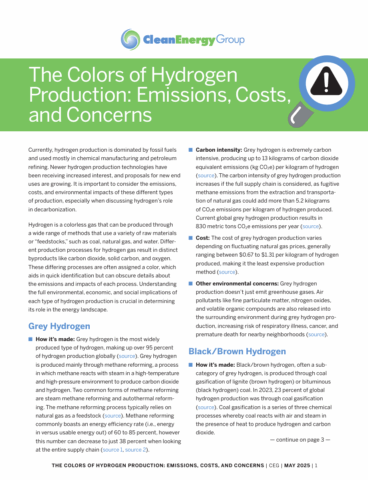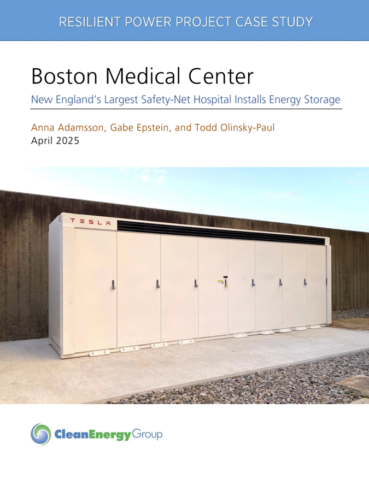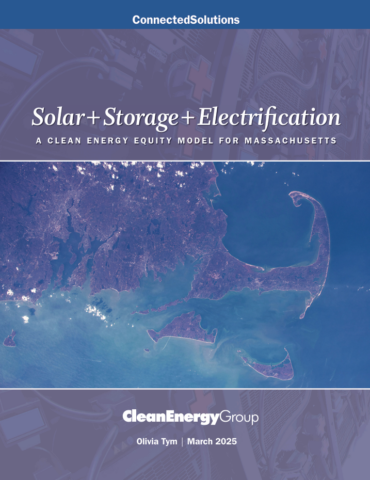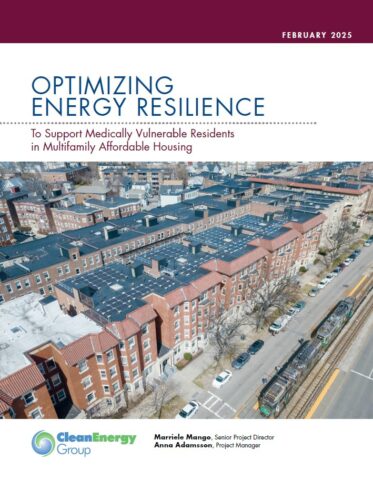Clean Energy Group
Hydrogen is a colorless gas that can be produced through a wide range of methods using a variety of raw materials or “feedstocks,” such as coal, natural gas, and water. Different production processes for hydrogen gas result in distinct byproducts like carbon dioxide, solid carbon, and oxygen. These differing processes are often assigned a color,…
A battery storage installation at Boston Medical Center demonstrates how hospitals can integrate energy storage into an efficiency or sustainability program to better manage peak demand and lower costly demand charges. The project is profiled in this case study by Clean Energy Group. Boston Medical Center (BMC) is the largest and busiest trauma and emergency…
A Massachusetts pilot program provides a replicable and scalable model for bringing renewable energy, battery storage, and electrification to low-income households. The Cape and Vineyard Electrification Offering (CVEO) is run by the Cape Light Compact, an energy services provider serving 210,000 customers in 21 towns on Cape Cod and Martha’s Vineyard. The CVEO pilot is…
The draft Connecticut Climate Resilient Energy code is a voluntary code intended to cover the installation of climate resilient energy systems and the provision of power to critical services during grid outages. The code covers the installation of climate resilient energy systems including solar, energy storage, and efficient heating and cooling to maintain living conditions…
In these comments, CEG urges DOE to extend the deadline for comments on the proposed scope of the Environmental Impact Statement for the California Hydrogen Hub by another 60 days and lays out the ramifications of hydrogen energy.
The Greenhouse gases, Regulated Emissions, and Energy use in Technologies (GREET) model is used to determine the lifecycle emissions of various energy sources, expressed as carbon equivalent emissions, and creates the framework for many monetary and market incentives related to energy production. In some cases, the values, assumptions, and calculations within each GREET model have…
In these comments submitted to the U.S. Department of Energy (DOE) Office of Clean Energy Demonstration, CEG urges DOE to extend the deadline for comments on the proposed scope of the Environmental Impact Statement for the Pacific Northwest Hydrogen Hub by another 60 days. This is due to limited information on the scope and locations…
The U.S. Treasury Department released final guidance on the 45V Clean Hydrogen Production Tax Credit in January 2025. While the guidance did contain the vital “three pillars” of incrementality, temporal matching, and deliverability, which are essential for ensuring hydrogen production does not lead to a massive increase in grid emissions, it also contains several concessions…
Power outages can quickly turn into a health crisis for the millions of Americans that rely on electricity for home medical devices, including life-support equipment (such as dialysis machines and ventilators) and technologies for independent living (such as electric wheelchairs, refrigeration for medicine, and internet for telehealth appointments). Many electricity-dependent residents live in multifamily affordable…














Comments on Environmental Impact Statement Notice of Intent for the Appalachian Hydrogen Hub
In these comments, CEG urges DOE to extend the deadline for comments on the proposed scope of the Environmental Impact Statement for the Appalachian Hydrogen Hub by another 60 days and lays out the ramifications of hydrogen energy.